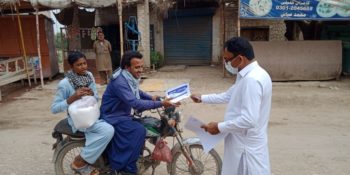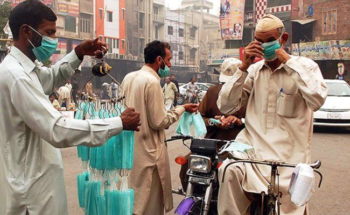
A school teacher shared her story, engaged in the education project[1] in Umerkot, of how her family is coping with the current COVID-19 pandemic.
Rukhsana Yasmeen is a teacher at the Government Boys Primary School, Police Thana. “The education of students in Umerkot have been effected very badly due to the lockdown imposed by the government to control the spread of coronavirus,” shared the concerned Rukhsana, “They will forget all that was taught to them. In addition, school not only serve the purpose of providing education, it also gives children a chance to interact socially and keeping them energized and fresh. With all this shutdown situation, children will be frustrated and baffled. It is difficult to say whether the students will be able to perform well in the final examination to be held in June as assigned by the government.”
The economic situation in Umerkot is tight and restricted nowadays due the lockdown. It has become troublesome for the daily wage labor force to find work and earn the little income they earned before this crisis. “Sitting at home with no or less money increases conflicts among the family members that adds on to the stress, uncertainty of when the situation will be controlled and other issues.”
Rukhsana’s husband is a labor worker who earns a daily wage for his family. In the current situation, he is unable to go out of the house to find work. “I am worried of how we will manage the monthly expenses such as rent, food and other household essentials with the single salary of mine. How long can we bear to live like this?”
The Sindh government has announced the provision of ration bags to people who earn a daily wage for their families. According to Rukhsana, the government officials have been affected by this crisis. The government should take some measures of supporting them as well. In addition, Rukhsana came to know that the Government of Sindh has deducted 5 percent of their salaries for contribution in relief funds. “Our future seems unclear.”
“At home, we try to maintain the distance. However, with a house of two rooms only, it is difficult to cope with all this distance. We are trying to follow social distancing as much we can but practically it seems very difficult.”
Keeping the children busy and engaged in study at home throughout the day is not an easy task according to Rukhsana. “There is very little entertainment resources at home. They do study for a while but cannot be engaged in school work the whole day. At the precautionary end, we are try to wash hands from time to time and use clean kitchen utensils when cooking and eating. Moreover, we are not drinking cold water nor taking a bath daily rather on alternative days. We ensure cleanliness at home as it the only way of keeping us safe at home from this pandemic situation.”
“It is good to see how efficiently our government is working to control the spread of this infectious disease. All shops, malls and other public places have been shutdown to avoid social gatherings. Never did we think that we will experience such a stressful state of life. Nevertheless, we will overcome positively and safely.”
[1] Early Childhood care and Education supported by Act for Peace


